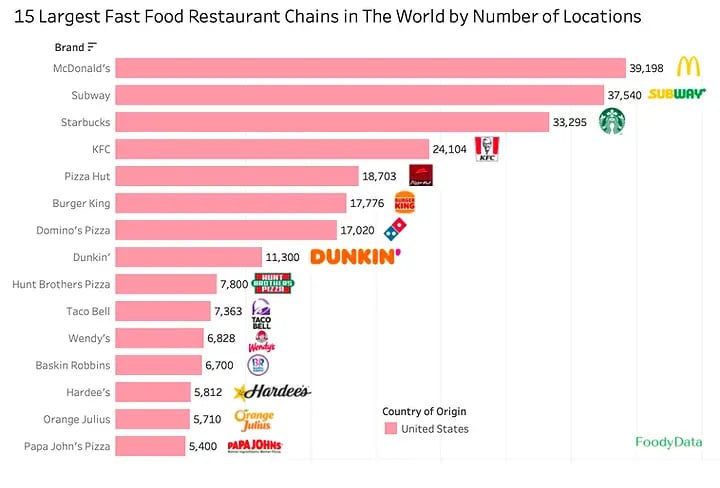What Is Franchise Marketing: Importance, Types, and Benefits
This might be a weird question to start with, but where did you buy breakfast or lunch this week?
From Dunkin’ and KFC to Burger King and McDonald’s, chances are you at least passed by one franchise business on your drives around town.
Franchising is a popular growth strategy used by some of the top businesses in the world. A franchise business is not just for food-related brands either. There are retail, real estate, travel, hotel, and home service franchise organizations, too.
While there are important advantages and disadvantages of franchising, the franchise business model is based on a simple concept.
A well-known company (the franchisor) gives individuals or smaller businesses (the franchisee) the right to use its brand name and expertise to set up an outlet of its own. Franchisees get access to an experienced support team and get to join an established brand personality. This helps them run their franchise system as efficiently as possible.
Do you know how much the franchise business industry contributes to the economy? It’s. A. Lot. Check out these numbers.
There are close to 800,000 franchise establishments in the United States alone. They generate over 800 billion dollars and employ over eight million people.
Franchise marketing is essential for franchisors and franchisees to attract new customers and clients and keep existing ones.
That said, the number of stakeholders involved can make franchise marketing complex. It definitely has a different set of challenges compared to promoting single-location businesses.
Franchise business owners and franchisees must work together locally, nationally, and globally. At the same time, they must keep the brand identity and franchise marketing plan consistent, effective, and replicable.
While it may seem daunting, creating a successful franchise marketing plan is possible. This article will help you better understand the franchise marketing world. We'll also identify a few of the tools you need to build an effective digital marketing strategy.
Keep reading to learn about valuable tools and resources that can upgrade your franchise marketing efforts in no time.
What is franchise marketing?
Franchise marketing refers to all the activities franchisors and franchisees use to build brand awareness, create loyal customers and grow revenue.
A franchise marketing strategy should be replicable across different outlets and regions. This sets it apart from the marketing strategy of a single-location business. The definition of franchise marketing is extremely broad.
It covers everything from email marketing and franchise SEO (search engine optimization) to public relations campaigns.
Franchise marketing can be divided into operational franchise marketing and franchise development marketing.
-
Operational franchise marketing. This includes the franchisor and franchisees' activities to attract new customers.
-
Franchise development marketing. This is carried out by the franchisor to sell franchises to potential franchisees.
Creating a solid franchise marketing strategy is a critical step for all franchisors. It is integral to promote the business in the regions where it operates and introduce it to potential franchise owners and customers.
Why is franchise marketing important?
The unique relationship between the franchisor and franchisee is the basis of the marketing strategy. Both stakeholders must work together so they can both succeed for. But if both parties don’t share the same franchise marketing vision, it can lead to roadblocks.
For example, someone who owns a McDonald's franchise business can’t start running a Christmas campaign offering a free McFlurry with every Big Mac without approval from the head office.
To create a cohesive business image, all in-person and digital marketing activities must work toward maintaining brand consistency across franchise locations.
Not every business has the potential to become the next KFC or 7-Eleven. But with a successful franchise marketing plan in place, they can succeed.
Benefits of franchise marketing efforts
Brand reputation
One of the most significant benefits of a franchise business is gaining automatic brand recognition. This helps attract customers in regions where you may not have a historical presence.
With effective franchise marketing, you can drive awareness by maintaining brand consistency. As you grow, more customers will recognize your business through your name, logo, and offerings.
Whether customers shop at a Hertz outlet in Miami or Los Angeles, they expect the same experience each time.
Franchise marketing requires that you create clear brand guidelines. This allows each local establishment to take part in building the brand identity and its reputation across locations.
Franchisees should also be encouraged to share their franchise marketing opinions and creative ideas with the head office. This helps the franchise owner keep good brand guidelines up-to-date and improve its franchising strategy regularly.
Capture market share
The biggest risk when setting up a new franchise location is if there is enough demand for the products or services you’re selling. But, in an overall franchise business model, you already know that the same offering has been successful in other locations.
The more success you have with location-specific marketing, the more likely you'll attract franchisees who want to build and share the fruits of a profitable brand. This helps you capture a larger market share and beat your competitors.
Start and grow customer relationships
Providing exceptional customer service is at the heart of all successful individual franchise locations.
You can use your local marketing efforts to reach out to customers and educate them about your brand and the value you provide.
Create two-way communication marketing channels through digital media, so your customers feel like they’re being heard. You must also give customers a platform to share their feedback. This helps create long-term relationships and increases customer loyalty.
3 Types of franchise marketing
If you’re interested in franchising your business, you may be wondering what are the 3 types of franchising models you can choose from? Read on to learn about them with the help of examples!
1. Business Format Franchises
This is the most common business type in the franchise industry. It allows individuals to buy a business with a reputed brand while aiding the expansion of the franchisor’s business.
The franchisor assists the new business owner with everything. This includes choosing the site and training the staff.
In exchange for access to the franchisor’s support, expertise, and trademarks, the new business owner must pay a regular royalty fee to the franchisor.
Examples include fast food outlets like Chick-Fil-A and Subway and fitness brands like Gold’s Gym.
2. Manufacturing Franchises
In this franchising model, the franchiser gives the franchisee the right to produce consumer or industrial goods using their branding and trademarks. This model is common in the clothing, automobile, and food and beverage industries.
Apart from manufacturing the goods, the franchisee may also have the license to distribute them.
Examples include Nestle, Pepsi, and Hyundai.
3. Single-Operator Franchise
A single-operator franchise is an agreement where the franchisor grants a franchisee the right to operate in one location. This type of franchise model appeals to new or first-time business owners since it requires limited investment.
There are many examples of independent contractors investing in a single-operator franchise. Consider the scenario of a self-employed electrician who wants to grow his business. He can invest in a reputed company offering franchises across the country.
This would give the electrician access to a more extensive customer base and support team to manage complaints and payments.
Your franchise marketing strategy may vary depending on the business model. The marketing plan for a manufacturing franchise will probably attract potential franchisees instead of the end consumer. It may also rely more on formal forms of advertising like email marketing and local SEO.
Business format and single-operator franchises would have different audiences. They will target the end consumer who can be best reached through social media platforms.
How Can Reputation Marketing Transform Your Franchise?
Find out how easy it can be to get more reviews, referrals, and sales—without spending a dime on ads!
Watch the Demo
Digital franchise marketing strategy
Franchise digital marketing uses online channels to drive traffic and revenue for brands. The goals are to grow your presence on the internet, maintain brand consistency, and increase awareness.
You can also use these franchise marketing channels to build lasting relationships with current and potential customers. This will help generate leads that convert into purchases.
Here are a few suggestions for a cohesive marketing strategy that you can use to level up your franchise digital marketing efforts:
1. Invest in video content marketing
Videos are an excellent way to show customers and potential franchisees your offerings. You can highlight the benefits of partnering with the franchisor and include real testimonials, which should be a staple in your marketing materials.
Using this type of visual content marketing is also a great way to stand out from your competition on social media and win your audience’s trust.
2. Create landing pages optimized for local SEO
Get a high-converting website with separate landing pages for each franchise location. This strategy can help you drive traffic to specific outlets and get data about location-wise demand.
You can use the landing page to get more leads and experiment on it to help increase conversion rates.
And don’t forget to include a clear call-to-action on your landing pages — the key to any successful franchise marketing campaign.
3. Harness the power of reviews
Reviews are an effective reputation management tool to drive sales through the power of social proof. 77% of consumers 'always' or 'regularly' read reviews before deciding if they should buy from a local business.
Reviews can also be an overlooked social media marketing tactic, but they shouldn't be! They're basically free content that users have created for you!
If you’re struggling to get customers to leave reviews, consider partnering with local marketing pros, NiceJob.
We can help take your franchise marketing plan to the next level by bringing in a steady stream of reviews on popular search engines like Google and social media platforms like Facebook. This results in better local SEO rankings and more sales.
Moreover, we offer easy-to-use automated products, such as Engage. It allows you to feature your best customer reviews on your website in under five minutes.
Explore more franchise digital marketing resources
There's no denying it; modern local business owners need a solid digital marketing franchising strategy to succeed. It's an indispensable tool to boost your brand’s reputation and increase sales among your target audience. It also helps convert potential customers into loyal brand advocates.
You'll find many key insights in our case studies if you want to learn more about franchise marketing.
Grow your franchise today with our automated review system
Find out how You Move Me franchise won hundreds of new reviews and earned $2 million in revenue
Read the Case Study






